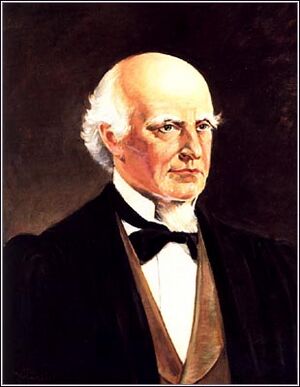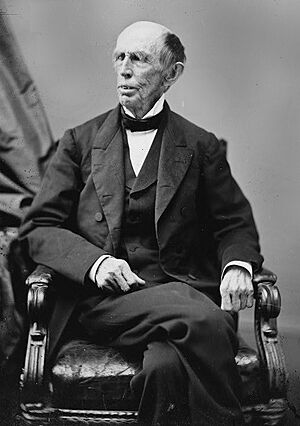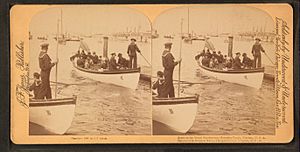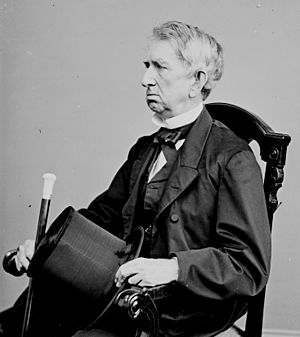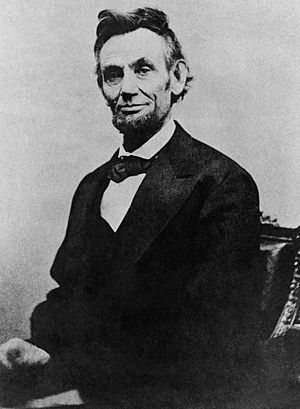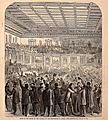Hampton Roads Conference facts for kids
The Hampton Roads Conference was a special meeting held during the American Civil War. It took place on February 3, 1865. The goal was to talk about how to end the war. The meeting happened on a steamboat called the River Queen. This boat was in Hampton Roads, Virginia.
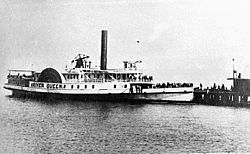
The Conference took place on the River Queen, near Union-controlled Fort Monroe in Hampton, Virginia.
|
|
| Negotiators |
Secretary of State William H. Seward
Vice President Alexander H. Stephens Assistant Secretary of War John A. Campbell Senator Robert M. T. Hunter |
|---|---|
| Languages | |
President Abraham Lincoln and Secretary of State William H. Seward represented the Union. Three leaders from the Confederate States were there. They were Vice President Alexander H. Stephens, Senator Robert M. T. Hunter, and Assistant Secretary of War John A. Campbell.
They talked about many things. These included ending the war and the future of slavery. They also discussed if the South would get money for property lost due to slavery ending. The only real agreement they made was about exchanging prisoners of war.
The Confederate leaders went back to Richmond right after the meeting. Confederate President Jefferson Davis announced that the North would not make any big compromises. Lincoln tried to create a plan for peace, but his own team disagreed with him. John Campbell kept trying to find a way to peace. He met with Lincoln again after the fall of Richmond.
Contents
Trying to Find Peace
By 1864, many people on both sides wanted to end the long and terrible Civil War. Several people tried to arrange a peace agreement that year. Francis Preston Blair was a friend to both Abraham Lincoln and Jefferson Davis. He tried to get Lincoln to visit Richmond for talks, but it did not work.
Blair suggested that the war could end if both sides stopped fighting. Then, they could unite to attack the French ruler Emperor Maximilian in Mexico. Lincoln asked Blair to wait until the city of Savannah was captured by Union forces.
Southern Efforts for Peace
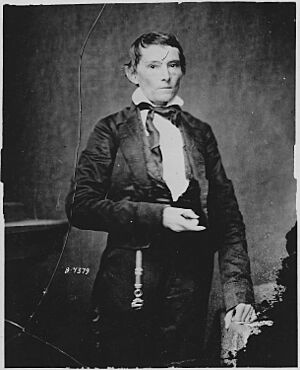
Confederate President Davis was running out of options. The Confederacy was close to falling apart. People in the South had wanted peace since the war began. These calls for peace grew stronger in 1864.
Alexander Stephens's Role
Alexander H. Stephens, the Vice President of the Confederate States, wanted to end the war. He had been trying since 1863. Stephens almost started talks with Lincoln in July 1863. But his efforts failed after the Confederate defeat at the Battle of Gettysburg. By 1864, Stephens openly disagreed with Davis's government. General William T. Sherman even invited him to discuss peace between Georgia and the Union.
Stephens spoke to the Confederate States Senate on January 6, 1865. He urged them to talk peace with the North. Some Confederate lawmakers agreed with Stephens. They began to push for negotiations.
John Campbell's Role
John Campbell was another peace leader. He had also been against the South leaving the Union. Campbell served on the Supreme Court of the United States from 1853 to 1861. He thought about quitting after Lincoln's first speech in March 1861. He stayed for a short time and supported a change to the Constitution. This change would protect slavery from federal interference.
Campbell wanted to stop the war. He helped try to arrange talks about Fort Sumter in Charleston harbor. On March 15, Campbell told a Confederate leader that Secretary of State Seward promised to leave Fort Sumter within five days. But the Fort stayed occupied. Campbell kept getting reassurances from Seward, but Lincoln had already ordered the fort to be resupplied. By April 12, talks had failed. The Bombardment of Fort Sumter began. Campbell then quit the Supreme Court and moved South. He became Assistant Secretary of War in Davis's government in 1862.
Campbell was criticized for trying to limit the number of people forced into the army. By late 1864, he was again pushing to end the war. He wrote a letter in 1865 describing how bad things were for the Confederacy. He wondered why people would not see that peace was needed.
Northern Views on Peace
Lincoln was clear that the Union must stay together. Slavery was a harder problem. The Republican Party had said in 1864 that they wanted to end slavery. But pushing too hard on this issue might upset some politicians and voters.
In July 1864, Lincoln made a statement. He said that any offer for peace that included keeping the Union together and ending slavery would be considered. He promised fair terms. Lincoln told a friend that his main concern was the Union. He said slavery would not stand in the way of peace. This helped him win the 1864 election.
Seward said in September 1864 that if the Confederate States gave up their independence, slavery would be decided by courts and laws. He invited the South to return to the Union.
After winning the election, Lincoln told Congress that a peace deal with Davis was unlikely. He said Davis would not willingly rejoin the Union. But Lincoln also said the South could end the war by stopping their fighting. He said if they stopped, any remaining issues could be solved peacefully through laws and votes. Lincoln also said he would not change the Emancipation Proclamation. He would not return any freed person to slavery.
Getting Ready for the Conference
Blair tried again in January 1865. He went to Richmond on January 11. He met with Davis and suggested a plan to end the war. This plan partly involved the North and South working together against the French in Mexico. Blair told Davis that Lincoln was more willing to talk.
On January 12, Davis wrote a letter inviting Lincoln to start talks. He wanted to "secure peace to the two countries." Lincoln replied that he would only discuss "securing peace to the people of one common country." Davis was upset by this. Blair blamed the political mood in Washington.
Davis then suggested a meeting between Generals Robert E. Lee and Ulysses S. Grant. Lincoln refused. Grant helped smooth things over. He convinced Lincoln to meet the Confederates at Fort Monroe. Davis chose his three representatives on January 28. He told them to explore all options except giving up independence.
Of the three Confederate representatives, Alexander Stephens and Robert Hunter wanted to focus on the idea of an alliance against France. Campbell was more interested in a plan for peace at home. Campbell wrote that Davis believed Lincoln cared more about Mexico than the war. He thought Lincoln might stop the fighting to unite troops against Mexico. Campbell and Hunter did not believe this, but Stephens did.
News of possible peace talks worried the Union Congress in late January. This was just before a vote on the Thirteenth Amendment. Some members feared that passing an amendment to end slavery would hurt the talks. Radical Republicans wanted a complete victory and harsh surrender terms. They were upset about any possible compromise. Opponents of the Amendment used these fears to try and stop its passage. Stephens later blamed this political reaction for the conference failing.
Lincoln's secretary, John Hay, tried to calm fears. But an Ohio politician named Sunset Cox demanded an investigation into the rumors. Lincoln issued a note saying no Confederates had arrived in Washington.
Cox investigated more and voted against the Amendment. But the Amendment passed anyway. Two people close to Seward sent him messages. They congratulated him and mentioned his upcoming meeting with the Confederate leaders. Historians believe these messages meant Seward had promised that passing the Amendment would come with a policy of peace. This policy might be accepted by Southerners and Northern Democrats.
On January 29, a Confederate officer with a flag of truce stopped the Siege of Petersburg. He announced the three Confederate peace leaders were coming. Soldiers from both armies cheered. On February 1, Seward left Annapolis on the River Queen for Fort Monroe.
The Conference Meeting
Lincoln and Stephens had been political friends before the war. The meeting started in a friendly way. Stephens talked about a military alliance against France in Mexico. But Lincoln stopped him. He asked directly about the South's independence. Lincoln, pushed by Campbell, said the South would have to stop fighting and accept federal rule. Campbell wrote that they learned very quickly that Davis's hopes were wrong. Union was the only condition for peace.
On the issue of slavery, Lincoln reportedly told the Confederates that people in the North had different ideas. They disagreed on how new laws would be enforced. Lincoln said the Emancipation Proclamation was a war measure. He said it would only permanently affect the 200,000 people who came under Army protection during the war. But he noted that courts might see it differently.
Seward reportedly showed the Confederates a copy of the new Thirteenth Amendment. He also called it a war measure. He suggested that if they rejoined the Union, they might be able to stop it from being officially approved. After more talk, Lincoln suggested that Southern states could "avoid the evils of immediate emancipation." They could do this by approving the Amendment to take effect later, perhaps in five years. Seward and Lincoln said they were not demanding "unconditional surrender." Seward said rejoining the Union under the Constitution was not humiliating.
Lincoln also offered possible payment for ending slavery. He may have mentioned $400,000,000. He later suggested this amount to Congress. Seward reportedly disagreed with Lincoln. Lincoln replied that the North had also been involved in the slave trade.
The meeting ended with an agreement on exchanging prisoners of war. Lincoln would release Stephens's nephew. In return, a Northern official in Richmond would be freed. Lincoln would also suggest that Grant set up a system for prisoner exchange.
What We Don't Know for Sure
There are no official records of the conference itself. All reports come from what the people involved said later. The two main accounts were written by Confederates Stephens and Campbell. They agree on most details. These accounts, along with other records, suggest that Lincoln and Seward might have been willing to compromise on slavery.
Lincoln's own messages show he might have been willing to give ground on slavery in private. The idea that Lincoln suggested a delayed approval plan was mentioned in a newspaper in June 1865. This was based on a report by Stephens after the meeting. Legally, Lincoln never believed the federal government could ban slavery in the states. That is why he always said the Emancipation Proclamation was only for wartime. Some historians believe Lincoln thought the rebel states would have the right to reject the Thirteenth Amendment if they rejoined the Union.
Seward's biographers generally agree that he might have suggested rejecting the Amendment. The Confederate delegates privately spread this idea. This went against Jefferson Davis's public statements that the surrender terms were unfair.
Some historians disagree with Stephens's view of the Conference. One historian, Michael Vorenberg, says Lincoln would have known that a constitutional amendment cannot be approved "prospectively." So, he thinks the story is doubtful. He suggests Lincoln might have preferred "gradual emancipation" but would not have said it was legally possible. Another historian, William C. Harris, also doubts the "prospective approval" story. This is because Campbell does not mention it in his 1865 letter. James McPherson thinks Stephens might have been putting his own ideas into Seward's words.
According to David Herbert Donald, Lincoln and Seward might have offered compromises because they felt slavery was going to end anyway. Giving in on slavery might have prevented more fighting. Walter Stahr, who wrote about Seward, agrees with this idea. He says Seward would have accepted a delay in approval to end the war. Another historian, Ludwell H. Johnson, thinks the peace talks were Lincoln's way to gain more political power. He wanted to create a new group of conservative politicians. This group would include Southerners. Johnson argues that talks would have built support among Northern Democrats and new Southern governments.
What Happened After
Congress discussed a plan to ask Lincoln for a report on the Conference. A politician named Willard Salisbury suggested that Lincoln reveal the exact terms he offered. Salisbury's idea failed, but the main plan passed. Lincoln released documents that Congress liked very much.
Lincoln's Amnesty Plan
Lincoln kept his promise to try for compensation. He asked for forgiveness and $400,000,000 for the Southern states. This would happen if they stopped fighting and approved the Thirteenth Amendment. Soon after returning to Washington, Lincoln wrote a plan for forgiveness. It offered pardons and the return of seized property, "except slaves." The plan said the Confederacy would get $200,000,000 if it stopped fighting before April 1, 1865. It would get another $200,000,000 for approving the Thirteenth Amendment before July 1, 1865.
These terms were not popular, especially with Lincoln's team. No such plan was approved. A newspaper reported that Seward wanted a peace agreement. He hoped it would help him become a leader of a new group of politicians in 1868.
Lincoln and Campbell's Meetings
Campbell kept pushing for a peace deal within the Confederacy. He wrote a letter on March 5 saying the South might lose, but it did not have to be destroyed. Campbell was the only Confederate government member to stay in Richmond after the Union took it over. He met with Lincoln twice to talk about the South's future. On April 5, Lincoln gave him a written message.
Lincoln repeated that three things were needed for peace. First, the national government must be in charge everywhere. Second, he would not change his stance on slavery. Third, fighting must stop completely, and all enemy forces must disband. He said he would consider any offers that fit these terms. He also said that if the war continued, the cost would be added to seized property. But seized property (except for slaves) would be returned to people in any state that stopped fighting quickly.
Campbell said Lincoln would pardon most Confederates except "Jeff Davis." Campbell pushed the peace terms Lincoln offered. But his letter to the Confederacy on April 11 was overshadowed. This was because Lee surrendered at Appomattox on April 9.
Campbell was later arrested. People thought he was involved in a plot to harm Lincoln. This was because his initials were found on a document.
In Movies and Books
The 2012 movie Lincoln shows a short part of the conference. It focuses on slavery and the Confederates' wish to block the Thirteenth Amendment. In the movie, neither Lincoln nor Seward suggests any compromise on slavery. Lincoln says slavery is "done" and the Thirteenth Amendment will surely be approved. Lincoln also encourages Stephens to understand that if Confederates give up certain rights, like "the right to oppress," they might find more honorable rights.
The conference is also mentioned in Jeff Shaara's book The Last Full Measure.
Images for kids
See also
 In Spanish: Junta de Hampton Roads para niños
In Spanish: Junta de Hampton Roads para niños
 | James Van Der Zee |
 | Alma Thomas |
 | Ellis Wilson |
 | Margaret Taylor-Burroughs |


